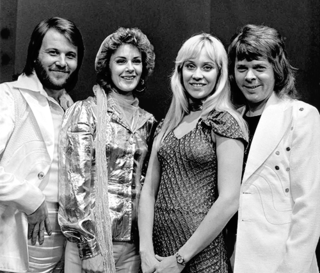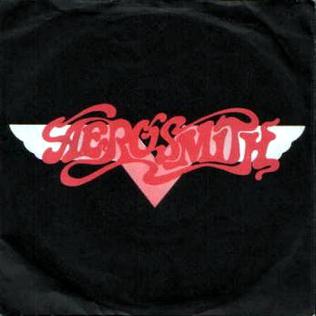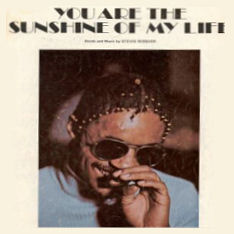1973 was a year in the 20th century.
1973 may also refer to:
- 1973 (number)
- "1973" (song), a 2007 song by James Blunt
- United Nations Security Council Resolution 1973
- 1973 (album), a 2012 album by Seirom
1973 was a year in the 20th century.
1973 may also refer to:

ABBA are a Swedish supergroup formed in Stockholm in 1972 by Agnetha Fältskog, Björn Ulvaeus, Benny Andersson, and Anni-Frid Lyngstad. The group's name is an acronym of the first letters of their first names arranged as a palindrome. One of the most popular and successful musical groups of all time, they became one of the best-selling music acts in the history of popular music, topping the charts worldwide from 1974 to 1982, and in 2022.
Queen or QUEEN may refer to:

The Byrds were an American rock band formed in Los Angeles, California, in 1964. The band underwent multiple lineup changes throughout its existence, with frontman Roger McGuinn remaining the sole consistent member. Although their time as one of the most popular groups in the world only lasted for a short period in the mid-1960s, the Byrds are today considered by critics to be among the most influential rock acts of their era. Their signature blend of clear harmony singing and McGuinn's jangly 12-string Rickenbacker guitar was "absorbed into the vocabulary of rock" and has continued to be influential.
IV may refer to:

KC and the Sunshine Band is an American disco and funk band that was founded in 1973 in Hialeah, Florida. Their best-known songs include the hits "That's the Way ", "(Shake, Shake, Shake) Shake Your Booty", "I'm Your Boogie Man", "Keep It Comin' Love", "Get Down Tonight", "Boogie Shoes", "Please Don't Go" and "Give It Up". The band took its name from lead vocalist Harry Wayne Casey's last name ('KC') and the 'Sunshine Band' from KC's home state of Florida, the Sunshine State. The group has had six top 10 singles, five number one singles and a number two single on the Billboard Hot 100 chart.

"Me and Bobby McGee" is a song written by American singer-songwriter Kris Kristofferson and originally performed by Roger Miller. Fred Foster shares the writing credit, as Kristofferson wrote the song based on a suggestion from Foster. A posthumously released version by Janis Joplin topped the U.S. singles chart in 1971, making the song the second posthumously released No. 1 single in U.S. chart history after "(Sittin' On) The Dock of the Bay" by Otis Redding. Gordon Lightfoot released a version that reached number 1 on the Canadian country charts in 1970. Jerry Lee Lewis released a version that was number 1 on the country charts in December 1971/January 1972 as the "B" side of "Would You Take Another Chance On Me." Billboard ranked Joplin's version as the No. 11 song for 1971.
911 or 9/11 may refer to:

"I Want You" is a song written by songwriters Leon Ware and Arthur "T-Boy" Ross and performed by singer Marvin Gaye. It was released as a single in 1976 on his fourteenth studio album of the same name on the Tamla label. The song introduced a change in musical styles for Gaye, who before then had been recording songs with a funk edge. Songs such as this gave him a disco audience thanks to Ware, who produced the song alongside Gaye.
1984 was a leap year starting on Sunday of the Gregorian calendar, the 1984th year of the Common Era (CE) and Anno Domini (AD) designations, the 984th year of the 2nd millennium, the 84th year of the 20th century, and the 5th year of the 1980s decade.
The Way may refer to:
"I Really Don't Want to Know" is a popular song written by Don Robertson (music) Howard Barnes (lyrics). The song was published in 1953.
"My Heart Cries for You" is a popular song, adapted by Carl Sigman and Percy Faith from an 18th-century French melody.

"Dream On" is a power ballad by Aerosmith from their 1973 debut album, Aerosmith. Written by lead singer Steven Tyler, this song was their first major hit and became a classic rock radio staple. Released in June 1973, it peaked at number 59 on the Billboard Hot 100 but hit big in the band's native Boston, where it was the number one single of the year on WBZ-FM, number five for the year on WRKO and number 16 on WMEX (AM). The song also received immediate heavy airplay on the former WVBF (FM), often showing up in the #1 position on "The Top Five at Five" in June 1973.
7 is a number, numeral, and glyph.

"The Way We Were" is a song by American singer Barbra Streisand from her fifteenth studio album of the same name. It was released as the album's lead single on September 27, 1973 through Columbia Records. The 7" single was distributed in two different formats, with the standard edition featuring B-side track "What Are You Doing the Rest of Your Life?"; the Mexico release instead included an instrumental B-side. The song was written by Alan Bergman, Marilyn Bergman, and Marvin Hamlisch, while production was solely handled by Marty Paich. "The Way We Were" was specifically produced for the record, in addition to three other tracks, including her then-upcoming single "All in Love Is Fair" (1974).

"You Are the Sunshine of My Life" is a 1973 single released by Stevie Wonder. The song became Wonder's third number-one single on the Billboard Hot 100 chart and his first number-one on the Easy Listening chart. It won Wonder a Grammy Award for Best Male Pop Vocal Performance, and was nominated for both Record of the Year and Song of the Year. This song was the second single released from the 1972 album entitled Talking Book, which stayed at number one on the R&B albums chart for three weeks.
Fourteen or 14 may refer to:

Killing Me Softly with Her Song is an album by American pop singer Johnny Mathis that was released on May 25, 1973 by Columbia Records and leaned heavily on covers of the latest radio favorites.

I'm Coming Home is an album by American pop singer Johnny Mathis that was released on September 21, 1973, by Columbia Records and was mainly composed of material written by the songwriting team of its producer, Thom Bell, and Linda Creed. Unlike several of the Mathis albums before it, I'm Coming Home relied primarily on new songs and included only two covers of established chart hits, both of which were by The Stylistics.

"You'll Never Get to Heaven " is a song composed by Burt Bacharach, with lyrics by Hal David. It was originally recorded by Dionne Warwick in 1964, who charted at number 34 in the US Billboard Hot 100 with her version. It was covered by the Stylistics in 1973, who reached number 23 in the US with their cover.